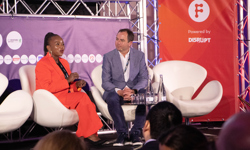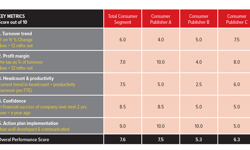According to conference moderator Jon Bernstein, if delegates go home with a handful of nuggets at the end of the day, then it’s been a good conference. By that measure, the PPA Business Media Summit 2015 was a success because I came away with nineteen:
1. You can sell more at higher prices if you’re creative
Philip Thomas, CEO, Cannes Lions, highlighted research which showed that McDonald’s had 54% higher RoI on their advertising campaigns that had won creative awards than on those that hadn’t.
2. Buy this book
Read ‘The Case for Creativity’ by James Hurman, and you will never question the case for creativity again, said Philip.
3. Reinvent to stay relevant and drive revenue
If you organise awards events, you should be constantly reviewing your categories. Never leave them unchanged from one year to the next.
4. Keep sponsors off the stage
Awards again. Do not let sponsors anywhere near the stage! To one incredulous delegate, who was obviously struggling to get their head round the concept of refusing a sponsor their every wish, Philip explained: “sponsors are a bit like children; if you clearly set the rules, then you’ll be fine. Just say ‘no, you can’t go on the stage because you’re not interesting’”. Ummm.
5. Don’t ape Spielberg
When shooting video, think about your capabilities and don’t get hung up on production values. Otherwise, you’ll never get started. Best to aim to produce lots of simple, snackable video, made quickly, not to last. Producing ten one minute videos is doable! says Bruce Daisley, MD, Twitter UK.
6. The ideal length of a mobile video is under one minute
Videos on mobile should ideally be under one minute and certainly never over three minutes. In terms of monetising mobile video, says Bruce, a short six second sponsored credit at the start works well.
7. Make money from your readers when they’re on someone else’s site
This, said Bruce, is the biggest opportunity for people in this room! Publishers should be looking at how they can sell their audiences on other people’s sites. Incisive Media, said John Barnes, was certainly looking to monetise its audience “across its own sites and across the internet”. It was clear that the idea of making money from your audience whilst they were NOT on your site was new to some delegates. Bruce recommended everyone do half an hour of homework and it will soon become clear. Think ad sales networks, digital ad exchanges et al. Bruce also recommended delegates take a look at Ghostery.
8. Don’t panic, everyone else is groping around in the dark too
It’s quite common to leave these conferences with a deep feeling of inadequacy. There’s so much to do and I’m only scratching the surface, yet look at all those clever panelists doing everything perfectly. When asked about her company’s use of analytics tools, The Drum’s Diane Young said, with refreshing candour, that “we’re not using anything as well as we should”. Alleluia.
9. Don’t hang around
Whilst, said Haymarket’s Adrian Barrick, “everything’s changing but everything’s staying the same”, one thing that definitely is different nowadays, is the need for speed. “Everything is done so much faster now.” William Reed’s Elaine Marshall, in describing her company’s recent rapid expansion into global markets, said that in the company’s 153 year history, more had happened in the last fifteen years than in the previous 138! Speed of execution was key, said Bruce Daisley; “doing things and doing things quickly has an impact.” Publishers should look to streamline their decision making processes. Asking oneself ‘what meetings can I do without?’ is often a good place to start.
10. Popular analytics tools
Jon Bernstein asked one panel what analytics tools their companies were using. Unsurprisingly, everyone used Google Analytics. The Drum was also beginning to use Parse.ly for testing the effectiveness of headlines, amongst other things. Incisive was using Scout, said John Barnes, to hone in on individuals’ behaviour on their sites and Hootsuite, for managing their social media activity on Twitter and Facebook, and to a lesser extent, on LinkedIn.
11. Embrace disruption
Adrian Barrick’s parting words of wisdom: “Embrace disruption and use it as a source of energy in your business. Kick back against anything that smacks of delay or obfuscation and call out processes and people who shy away from that.”
12. Don’t forget the foot soldiers
Whilst speed is a necessity, you need to be careful not to over extend your supply lines. One key lesson Elaine Marshall had taken from William Reed’s global expansion was the importance of all the support departments, sorting out the unglamorous but critical areas of IT delivery and HR / legal. A simple thing like setting up a reliable Wi-Fi connection can seriously slow things down if not managed properly.
13. Speakers are everything
If you’re organising a conference, don’t skimp on the speakers, said Centaur’s Caroline Jackson Levy. Invest in them and avoid poor (not the word she used) ones like the plague. And don’t forget the after-care! After the recent Festival of Marketing, Caroline’s top priority was the thank you letters to all the speakers.
14. The more the merrier
Festivals are all the rage now, but don’t fall into the trap of simply renaming your existing conference, a festival. Festivals, says Caroline, are different, they imply abundance. Content overload is the name of the festival game. Centaur’s Festival of Marketing consisted of: 2 days, 12 stages, 257 speakers, 160 hours of content, 5 headline speakers, 16,000 square metres, 3,000 visitors, 2 formal lunches, 2 parties, 1 fireworks display, 12 awards ceremonies and 1 curated exhibition.
15. Use data and testing to see off the HiPPO
The HiPPO (highest paid person’s opinion) holds sway in many organisations and it’s not always conducive to effective decision making. The best way to combat it, says UBM’s Luke Bilton, is through a focus on testing and data. At UBM, there had been a mind shift towards data-driven decision making and this had helped constrain the wilder excesses of the HiPPO.
16. Get inside your user’s head
For BMJ’s Luisa Dillner, it was important for publishers not to get too hung up on their products. Instead they should first aim to fully understand the user experience; what do they need and how do they use (or not) your products. This is not just a matter of asking them, but also of observing them and, to this end, BMJ has set up a Collaboration Laboratory (Co-Lab), an actual physical space within the organisation for product testing.
17. Kill your kittens
Beware pet projects, says Luisa. You have to be ruthless and terminate projects that are going nowhere. Proper prototype development and testing usually takes the emotion out of the process.
18. Google’s community tools work!
In the final keynote, Tim Brooks, CEO of the BMJ spoke of the “desirability of candour when running a business”. Be open and honest with your team and you will get further faster. Two of the initiatives BMJ has introduced have been greatly facilitated by the use of Google community tools; firstly, the practice of videoing the fortnightly technology prioritisation meetings and putting the video on the firm’s intranet, a practice which had, said Tim, radically improved the quality of tech proposals. And, secondly, the minutes of the firm’s regular management meetings are published, also on the intranet; the only downside of this, conceded Tim, was that the practice shattered the illusion of C-suite competence!
19. The secret of publishing success
Are you aiming for the stars? If so, Tim had a pearl of wisdom from Sir David Arculus, a titan of the publishing world and one of Tim’s early mentors. When asked how he had managed to get to his exalted position, Sir David had replied that over the course of his long career, more than half of the decisions he had made had turned out to be correct.
Nineteen golden nuggets represent a good day’s work. Lots of stuff to be getting on with, but as ever with conferences, it’s one thing to hear what we should be doing, but quite another actually getting round to doing it. Mañana.












